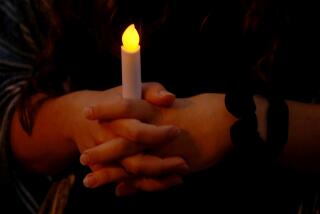Egypt’s opposition faces internal dissent
- Share via
CAIRO — He was a boy in the mosques of Alexandria when the Muslim Brotherhood took him into its fold, inviting him to soccer matches and trips to the seaside.
The brothers told Mustafa Naggar to be true to God and find a mission in life. He has done that. But the spiritual evolution and political ambitions of the 28-year-old dentist have put him at the center of a struggle between conservatives and reformers that may reshape Egypt’s strongest opposition voice.
Naggar is a cheery, unassuming man, but his passionate blog, Waves in the Sea of Change, blames the brotherhood for a religious rigidity that has weakened the Islamic party as a political force and distanced itself from day-to-day concerns of most Egyptians.
He and other young brotherhood members began blogging to attack the government of secular President Hosni Mubarak, but now they have turned their cyber-debate toward their organization’s stands on women’s rights, religious freedom and tolerance.
“Our biggest concern is changing the group’s religious education system. It’s obsolete and unable to create minds to contribute to an Islamic renaissance,” Naggar said. “Our new generation needs an open society toward moderate Islam and away from extremist Wahhabi values.”
This Internet revolution strikes at the Muslim Brotherhood’s identity. The organization, founded in 1928, has renounced violence and supports democratic change in Egypt, but it is allied with the militant group Hamas in the Gaza Strip. Hundreds of the banned party’s members are arrested each year; human rights groups say Mubarak is portraying the brotherhood followers as terrorists in an effort to silence his most potent detractors.
The brotherhood is praised for its community outreach services, but often viewed as out of touch, too rooted in religious dogma and its quest for an Islamic state. This ideology and constant pressure from government security forces have left the organization unable to create a credible coalition with leftists, nationalists and others to seriously challenge the ruling National Democratic Party.
In one of his posts, Naggar urged the brotherhood to “question ourselves and admit our mistakes. It is not shameful to revise our ideas and change our positions. It is not shameful to be brave enough and say that we were mistaken. What is really shameful is not to speak about our mistakes and claim that our ideas are sacred.”
Such soul-searching represents an unprecedented public criticism of the bureaucracy and thinking in a major Islamic movement and has shattered the secrecy prized by the brotherhood, said Khalil Anani, an expert on the group. He suggested that the brotherhood’s leadership is threatened by the brashness of its young reformers, yet it needs these Web-savvy critics to reach new generations of Muslims.
‘Abide by moral values’
The bloggers “have gone beyond their role as a media tool” for the brotherhood and have emerged as “rebels, freed from ideological and organizational constraints,” Anani wrote for the magazine Arab Insight.
Mahmoud Ezzat, secretary-general of the Muslim Brotherhood and one of the group’s staunchest conservatives, said the leadership didn’t want its young members to be “scared to voice their beliefs. We are just asking those youths to abide by moral values, not to exaggerate or insult anyone, [and] to double-check whatever they post.”
He denied suggestions that the brotherhood is stifling new ideas and casting out reformers. He added, “There should be moral regulations to blogging; otherwise, we won’t be able to benefit from this new technology.”
But the bloggers have stung the leadership. Abdelmonem Mahmoud said he was blackballed by the group in 2007 when he protested the brotherhood’s slogan, “Islam is the solution,” and its platform that opposes allowing a woman or Coptic Christian to serve as Egypt’s president. He and Naggar have also complained of the organization’s tradition of choosing religious scholars over qualified politicians when selecting its candidates.
“They told me to leave the brotherhood,” said Mahmoud, a 28-year-old lawyer, who spent six months in jail in 2006 after police raided a brotherhood protest. “They said I violated the group’s decisions. But I am still a Muslim Brother. I am a true Brother. The true believe in moderate Islam. Islam is not about coercion.”
Egypt is increasingly a nation with hijabs on the streets and devotion in the air. The educated and middle class, the core of the brotherhood’s supporters, are growing more religious as Mubarak’s government has been unable to stem corruption and fix inflation and severe social problems. The bloggers view this as a crucial moment to broaden the group’s appeal to the 45% of Egyptians who live on $2 or less a day.
The brotherhood has long been a perplexing problem for the U.S., which has been calling for democratic reform across the Middle East. When the organization fielded its members as independents and won 20% of the seats in the 2005 parliamentary elections, the Bush administration, wary of a spreading political Islam, did little to oppose Mubarak’s crackdown and isolation of the group. The bloggers say they are trying to make the brotherhood more palatable to the West, borrowing from the efforts of Turkey’s ruling Justice and Development Party, which allows for division between religion and the state.
‘More reasoning’
The brotherhood often appears at odds with itself, the rumblings of its internal debates occasionally surfacing to reveal ideological rifts. Many of its leaders hardened their beliefs in Egypt’s prisons or after escaping to Saudi Arabia and other Persian Gulf countries where they became followers of ultraconservative Salafi and Wahhabi principles.
“When the brotherhood feels threatened by the state, it rallies around the conservatives and that takes it further from the reformists,” said Mahmoud. “It is the state oppression that is actually empowering the conservatives. But our generation is different. We are calling for more reasoning, for more reinterpretation.”
Naggar sat the other day in a Western coffee shop, wearing bluejeans and a button-down blue and white striped shirt. He sipped pear juice. Elton John and U2 songs drifted from speakers above him. He said his blog had liberated him from the arcane internal rules and layered conservatism that have prevented the brotherhood’s reformers from advancing.
“There should be no contradiction between Islam and liberalism. There must be a balance between religion and society,” he said. “The man-made Islamic heritage needs to be changed. We have new technology. We have a new voice.”
--
Noha El-Hennawy of The Times’ Cairo Bureau contributed to this report.
--
On latimes.com
Alas, no cake
Praised, widely cited and gently lampooned, Babylon & Beyond has its first birthday.
latimes.com/babylon.
More to Read
Sign up for Essential California
The most important California stories and recommendations in your inbox every morning.
You may occasionally receive promotional content from the Los Angeles Times.














